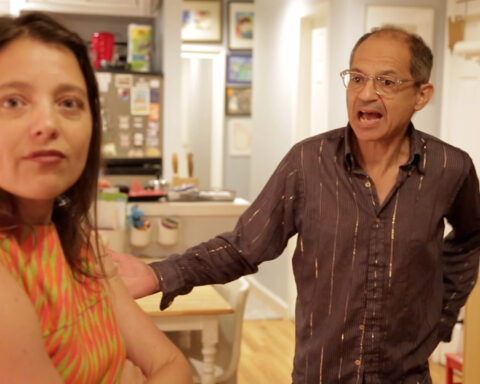When We Walk
(USA, Canada, 79 minutes)
Dir. Jason DaSilva
Programme: World Showcase (World Premiere)
For Jason DaSilva, making When We Walk was an act of desperate love, survival, and confrontation with the abyss. DaSilva’s subjects are himself, his family, and the vicious advancing of the primary progressive multiple sclerosis that’s killing him. On camera, and in voiceover, 40-year old DaSilva addresses the audience, but more importantly, his young son. The film is a declaration of love for the boy and a document of how he lives as the disease escalates.
DaSilva’s adoration for his three-year old spikes when his wife, burnt out by the situation, leaves him. She takes the boy from New York City, which has the best home caregiving in the U.S., to Texas, where it’s abysmal.
DaSilva considers relocation in Austin to be close to his son, who becomes distant and hostile during Skype calls. But in the Lone Star State, which has no income tax revenue to support people in trouble, DaSilva faces an agonizing choice. He can live in a Texas nursing home where he might be able to connect with his son, and might die within a year, or return to his New York apartment and the Skype calls.
DaSilva comes across as a persistent, proactive character whose constant strategizing and various moves give both his life and documentary a lot of drive. He files a court case to get more access to his son and induce his wife to return. He links up with his separated parents in search of some kind of wisdom and comfort. In a doc that doesn’t sentimentalize, his mother turns out to be a tough talking harsh woman although his father listens to him and takes some action.
When DaSilva needs to increase home care to 24/7, he films job interviews at a long board table, explaining his needs and insisting that he’s “very busy.” Making the doc, even when he reaches the point of needing assistance while working at his desktop, keeps him vital. This sequel to 2013’s Emmy-winning When I Walk allows him to survive while making future plans.
DaSilva never averts his gaze from physical and emotional pain. But his approach tends to be playful, deploying home movies, stylization, and animation that punctuates key moments. In one scene, a disabled friend says he understands why DaSilva’s wife left him. Who wants to wake up with someone covered with piss? I would run away from myself, the guy jokes. At one point, when DaSilva tries to find a woman online, and his eyesight is failing, a caregiver points out he’s somehow able to see pretty girls on a phone.
When We Walk tells a deeply moving personal story with unflinching clarity and self-deprecating humour while it exposes how the US Medicaid system abandons vulnerable people.









